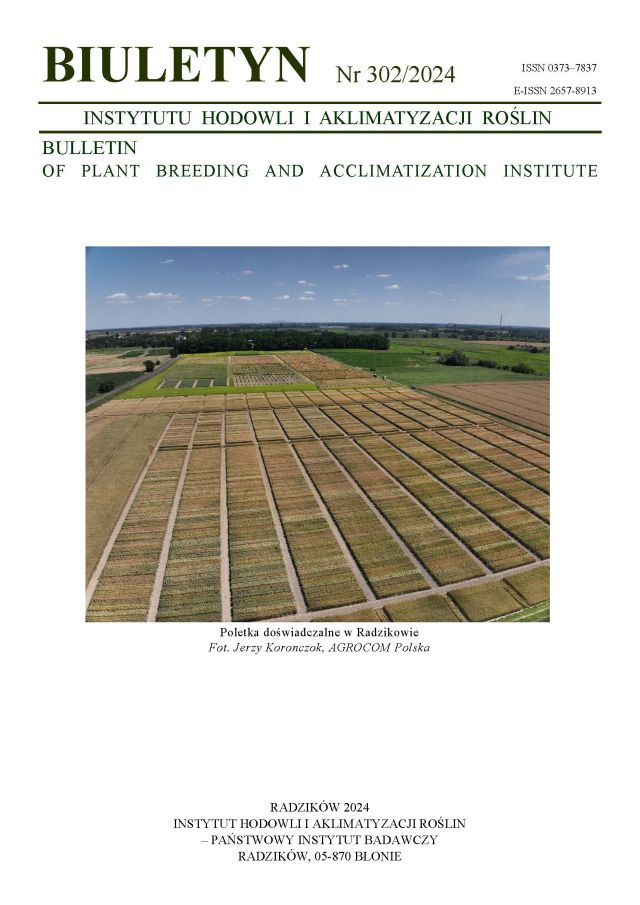Yield of oat in relation to fertilization with microelements
Wojciech Kozera
biuro.dziekana.wrib@pbs.edu.plKatedra Chemii Rolnej, Wydział Rolniczy, Akademia Techniczno-Rolnicza, Bydgoszcz (Poland)
Edward Majcherzak
Katedra Chemii Rolnej, Wydział Rolniczy, Akademia Techniczno-Rolnicza, Bydgoszcz (Poland)
Bożena Barczak
Katedra Chemii Rolnej, Wydział Rolniczy, Akademia Techniczno-Rolnicza, Bydgoszcz (Poland)
Krystian Nowak
Katedra Chemii Rolnej, Wydział Rolniczy, Akademia Techniczno-Rolnicza, Bydgoszcz (Poland)
Abstract
In the years 1999–2001, the one-factor field experiment was carried out, in which grain yield, content of proteins and total nitrogen in the oat grain were determined. The oat was foliar fertilized with solutions of microelements (Cu, Zn, Mn, Mo, B) in a form of individual inorganic salts and as a multi-component fertilizer (called Mikrochelat Gama) containing chelated constituents. Foliar applying of copper, manganese, zinc and molybdenum significantly increased yield of the oat grain. Foliarly applied molybdenum was the only microelement that significantly raised the total nitrogen content in the tested oat grain. Spraying with water solutions of copper, molybdenum, manganese and zinc resulted in a statistically proven increase in grain protein. Under the effect of microelements applied together as multi-component fertilizer Mikrochelat Gama, a significant increase in oat grain and protein yield was achieved.
Keywords:
grain yield, microelements, protein, protein yieldReferences
Gąsiorowski H. (red.). 1995. Owies — chemia i technologia. PWRiL, Warszawa.
Google Scholar
Nielsen F. H. 2002. The nutritional importance of boron throughout the life cycle of higher animals and humans. In: Boron in plant and animal nutrition. Plenum Publishers, New York: 37 — 50.
DOI: https://doi.org/10.1007/978-1-4615-0607-2_4
Google Scholar
Ruszkowska M., Wojcieska-Wyskupajtys U. 1996. Mikroelementy — fizjologiczne i ekologiczne aspekty ich niedoborów i nadmiarów. Zesz. Probl. Post. Nauk Rol. 434: 1 — 11.
Google Scholar
Spiak Z. 2000. Mikroelementy w rolnictwie. Zesz. Probl. Post. Nauk Rol. 471: 29 — 34.
Google Scholar
Szewczuk C., Michałojć Z. 2003. Praktyczne aspekty dolistnego dokarmiania roślin. Acta Agroph. 85: 19 — 29.
Google Scholar
Tobiasz-Salach R., Bobrecka-Jamro D. 2003. Wpływ wieloskładnikowych nawozów dolistnych na plonowanie i skład chemiczny owsa. Acta Agroph. 85: 89 — 98.
Google Scholar
Wróbel S. 2000. Poziom plonowania krajowych upraw produkcyjnych owsa a zawartość mikroelementów w glebie i roślinach. Zesz. Probl. Post. Nauk Rol. 471: 609 — 617.
Google Scholar
Ziółek E., Desoń-Barańska B., Szafrański W. 1992. Wpływ nawożenia makro- i mikroelementami na zawartość i skład aminokwasowy białka w ziarnie owsa i jęczmienia jarego w zależności od warunków siedliskowych. Zesz. Nauk AR w Krakowie 32: 375 — 395.
Google Scholar
Authors
Wojciech Kozerabiuro.dziekana.wrib@pbs.edu.pl
Katedra Chemii Rolnej, Wydział Rolniczy, Akademia Techniczno-Rolnicza, Bydgoszcz Poland
Authors
Edward MajcherzakKatedra Chemii Rolnej, Wydział Rolniczy, Akademia Techniczno-Rolnicza, Bydgoszcz Poland
Authors
Bożena BarczakKatedra Chemii Rolnej, Wydział Rolniczy, Akademia Techniczno-Rolnicza, Bydgoszcz Poland
Authors
Krystian NowakKatedra Chemii Rolnej, Wydział Rolniczy, Akademia Techniczno-Rolnicza, Bydgoszcz Poland
Statistics
Abstract views: 76PDF downloads: 36
License
Copyright (c) 2006 Wojciech Kozera, Edward Majcherzak, Bożena Barczak, Krystian Nowak

This work is licensed under a Creative Commons Attribution-ShareAlike 4.0 International License.
Upon submitting the article, the Authors grant the Publisher a non-exclusive and free license to use the article for an indefinite period of time throughout the world in the following fields of use:
- Production and reproduction of copies of the article using a specific technique, including printing and digital technology.
- Placing on the market, lending or renting the original or copies of the article.
- Public performance, exhibition, display, reproduction, broadcasting and re-broadcasting, as well as making the article publicly available in such a way that everyone can access it at a place and time of their choice.
- Including the article in a collective work.
- Uploading an article in electronic form to electronic platforms or otherwise introducing an article in electronic form to the Internet or other network.
- Dissemination of the article in electronic form on the Internet or other network, in collective work as well as independently.
- Making the article available in an electronic version in such a way that everyone can access it at a place and time of their choice, in particular via the Internet.
Authors by sending a request for publication:
- They consent to the publication of the article in the journal,
- They agree to give the publication a DOI (Digital Object Identifier),
- They undertake to comply with the publishing house's code of ethics in accordance with the guidelines of the Committee on Publication Ethics (COPE), (http://ihar.edu.pl/biblioteka_i_wydawnictwa.php),
- They consent to the articles being made available in electronic form under the CC BY-SA 4.0 license, in open access,
- They agree to send article metadata to commercial and non-commercial journal indexing databases.
Most read articles by the same author(s)
- Wojciech Kozera, Bożena Barczak, Effects of leaf fertilization of potato plants with microelements on fractional composition of proteins in tubers , Bulletin of Plant Breeding and Acclimatization Institute: No. 243 (2007): Regular issue
- Tomasz Knapowski, Wojciech Kozera, The The yield and grain quality of winter wheat grown under conditions of differentiated nitrogen and sulfur fertilization , Bulletin of Plant Breeding and Acclimatization Institute: ONLINE FIRST
- Bożena Barczak, Wojciech Kozera, Krystian Nowak, Edward Majcherzak, The effect of fertilization with ammonium nitrate and microelements on yields of grain and protein of the oat cultivar Komes , Bulletin of Plant Breeding and Acclimatization Institute: No. 239 (2006): Regular issue
- Edward Majcherzak, Wojciech Kozera, Krystian Nowak, Bożena Barczak, Contents of amino acids in grain of oat fertilized with ammonium nitrate with addition of microelements , Bulletin of Plant Breeding and Acclimatization Institute: No. 239 (2006): Regular issue
- Bożena Barczak, Wojciech Kozera, The influence of leaf dressing with microelements on the content and fractional composition of protein in barley and oat grain , Bulletin of Plant Breeding and Acclimatization Institute: No. 233 (2004): Regular issue
- Krystian Nowak, Edward Majcherzak, Bożena Barczak, Wojciech Kozera, Effect of foliar applied microelements on the contents of nitrogen and amino acids in oat grain and on the indices of biological value of protein , Bulletin of Plant Breeding and Acclimatization Institute: No. 239 (2006): Regular issue














